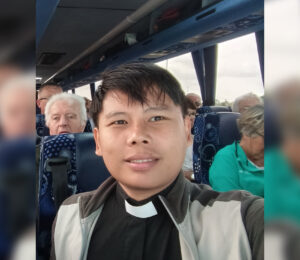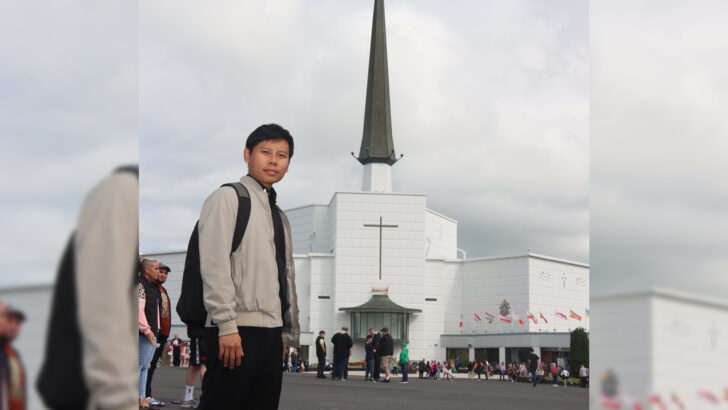Ireland is the host for many international priests and missionaries who come to study, either for a long period or on short trips, Fr Simon (Young) Ye Yint Naing Saw, from Myanmar, is one of those foreign priests. Fr Young lived in Knock and Portlaoise during the Summer months to improve his English, and in exchange, he helped in the parishes.

Talking to The Irish Catholic, Fr Young shared his views of Catholic life in the context of the dictatorship in his native country, his faith, his life as a student in Rome and his experiences in Ireland. Read the interview below.
Q: Myanmar is currently all over the news, as Pope Francis has offered the imprisoned prime minister Aung San Suu Kyi refuge in the Vatican. As a priest from Myanmar living in Rome, what is your opinion on that?
A: Pope Francis offering refuge to State Counsellor Daw Aung San Suu Kyi is a significant gesture. It shows that the Holy Father stands in solidarity with the people of Myanmar, especially at a time when much of the world seems to have forgotten the ongoing civil war and suffering in our country. His invitation serves as a reminder to global leaders not to overlook the plight of Myanmar.
Daw Aung San Suu Kyi has dedicated her entire life to the people of Myanmar. She chose the well-being of her country over her own family. Even if she were released from prison, I believe she would continue to stand by the people. I recall her saying before the coup that her greatest hope is to witness real peace in Myanmar before she dies.
Q: You come from a country where only 1.3% of the population is Catholic. Please, tell us about the moment you heard the Vocation calling and decided to listen to it.
A: Even though Catholics make up only a small percentage of the population in Myanmar, the deep faith in God among the faithful keeps vocations strong. From a young age, I sensed that God might be calling me to the priesthood. It was through my mother that I first encountered this possibility, as she would tell me bedtime stories from the Bible about Adam and Eve, Noah, and Moses. These stories, along with our nightly prayers, helped me develop a familiarity with the faith. However, it wasn’t until a powerful moment of recognition, through prayer and reflection, that I truly heard and accepted God’s call.
Though many young people in Myanmar are not called to religious life, they have a strong spirit of service and sacrifice for the Church, which is a source of hope for its future.
Q: What are the main difficulties of being a Catholic priest in Myanmar today?
A: Yes, absolutely there are challenges in being a Catholic priest in Myanmar today. Ongoing civil war creates instability and dangerous areas difficult to reach and serve. Many studies have shown that the main active parishioners are young people and they do in fact end up emigrating because of limited job opportunities. Compulsory military service (most likely) is also a pressure — young men get conscripted and find themselves serving in different zones away from their families (and the Church). Poverty also is a factor, the needs of their families are more important, so young people have to go to work instead of being involved in the life of the Church or follow vocation.
Q: You commented in your article for the October issue of the Intercom about your ministry, travelling and evangelising. Is that what you plan for your future? To travel around and bring the word to distant villages?
A: Taking the gospel to remote villages has always been a touching aspect of my work as a minister and one I hope to keep up. One of the most heart-warming experiences for me was when I went to a small village that had been isolated without a priest for years in the Ayeyarwady Delta. Everyone in the community poured out, crying with gratitude, just by laying eyes on me. Being able to say Mass with them, and listen to their stories of perseverance reminded me once again of how faith could really move mountains, and that my toil is not in vain.
Since I am also a student of leadership and management at the Gregorian University, then it is my plan to put these skills into my pastoral work. I think this will enable me to not only go and evangelise but also to support the leadership of local churches and community service. And so, while I still want to bring the word into these hard-to-reach areas, which is also important… I locate it within a context that can build sustainable support and leadership in these places.
Q: You are currently studying in Rome and living in the Irish College there. How did that happen? Could you tell us about your experience in Rome?
A: In 2021, I got an invitation letter from the Irish College but my plans to study abroad fell apart because of COVID-19. In the pandemic, I also lost my diocesan bishop, John Mahn Hsein Hgyi. Resulting from the COVID-19 lockdown, I shared three meals a day at the St Peter Cathedral compound in the Pathein Diocese.
Still, in the midst of these tribulations, God gave me a second opportunity to continue my study in Rome. My trip was so exciting because it was my first time travelling abroad alone. When I arrived in Rome, I was late for the start of the semester as classes had already begun, and as I had received a half scholarship, that almost made me lose this opportunity. But my new bishop sent me here, and with his permission, I quickly applied for my visa and made my way to Rome.
I was fortunate to meet a family from Myanmar who live there. Their kindness made my transition much easier and I am grateful for their assistance during this important time in my life”
I love living in Rome. I feel I’ve truly experienced the essence of democracy here. Initially, I was afraid of the police, but now I feel more comfortable. This journey has pushed me out of my comfort zone, and I am grateful for the growth it has brought me.
Q: Did you have any previous Irish connections?
A: I do not have any previous Irish connections. Travelling to Ireland was challenging for me, however, when I arrived, I was fortunate to meet a family from Myanmar who live there. Their kindness made my transition much easier and I am grateful for their assistance during this important time in my life.
Q: You lived in Knock and Portlaoise during the Summer months. Could you tell me about this experience?
A: My encounters in Knock and Portlaoise were quite different. In Knock Shrine, my principal responsibilities were hearing confessions for three hours each day and anointing the sick in the Basilica. Knock is an extremely quiet and contemplative place, which made me feel somewhat like a hermit. The first week was challenging for me as I struggled with the language but eventually, I became more comfortable speaking.
In contrast, my time in Portlaoise offered a more active parish experience. I also participated in prayer meetings, heard confessions, delivered homilies, and celebrated Mass. This environment was much busier and allowed me to engage more with the community. Both experiences gave me an understanding of pastoral work, each in its own unique way.
Q: How is the Church life in Ireland compared to Myanmar and Rome?
A: Church life in Ireland, Myanmar and Rome have both unique qualities and challenges.
There is a large and loyal Catholic population in Ireland, for whom the parish once played a central part in their life. The public events and festivals built a sense of community, and Christianity played a major role in the social services provided to the people.
One small but committed Catholic community can be found in Myanmar, where the faithful endure active civil war. It provides support and hope by serving as an unifying force.
Rome is a rich spiritual arena, serving as the Headquarters of the Catholic Church offering possibilities to grow spiritually and to get involved in Global Church activities. The Vatican Palace has the presence of an able administration, giving rise to rational leadership and inspiring occasions.
Q: Do you ever plan to come back to Ireland? Even staying just for the summer months, did you leave friends behind when went back to Rome?
A: Yes, I plan to return to Ireland during the summer holidays, because I want to reconnect with my friends and the faithful community there. My time in Ireland was special, and I formed meaningful relationships that I truly cherish. Leaving those friends behind when I returned to Rome was difficult but I look forward to visiting them again and sharing more encounters.


 Renata Steffens
Renata Steffens Fr Simon Young in Knock
Fr Simon Young in Knock 